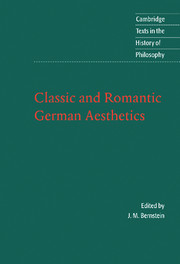Book contents
- Frontmatter
- Contents
- Introduction
- Chronology
- Further reading
- Note on the texts
- Aesthetica in nuce: A Rhapsody in Cabbalistic Prose (1762)
- Laocoön: An Essay on the Limits of Painting and Poetry (1766)
- From ‘On the Artistic Imitation of the Beautiful’ (1788)
- ‘Kallias or Concerning Beauty : Letters to Gottfried Körner’ (1793)
- ‘Oldest Programme for a System of German Idealism’ (1796)
- ‘Letter to Hegel, 26 January 1795’
- ‘Being Judgement Possibility’ (1795)
- ‘The Significance of Tragedy’ (1802)
- ‘Remarks on Oedipus’ (1803)
- From Miscellaneous Remarks (1797)
- ‘Monologue’
- ‘Dialogues’ (1798)
- ‘On Goethe’ (1798)
- ‘Studies in the Visual Arts’ (1799)
- From ‘Critical Fragments’ (1797)
- From ‘Athenaeum Fragments’ (1798)
- From ‘Ideas’ (1800)
- ‘On Goethe's Meister’ (1798)
- ‘Letter About the Novel’ (1799)
- ‘On Incomprehensibility’ (1800)
- Index
- Cambridge texts in the history of philosophy
From Miscellaneous Remarks (1797)
Published online by Cambridge University Press: 05 June 2012
- Frontmatter
- Contents
- Introduction
- Chronology
- Further reading
- Note on the texts
- Aesthetica in nuce: A Rhapsody in Cabbalistic Prose (1762)
- Laocoön: An Essay on the Limits of Painting and Poetry (1766)
- From ‘On the Artistic Imitation of the Beautiful’ (1788)
- ‘Kallias or Concerning Beauty : Letters to Gottfried Körner’ (1793)
- ‘Oldest Programme for a System of German Idealism’ (1796)
- ‘Letter to Hegel, 26 January 1795’
- ‘Being Judgement Possibility’ (1795)
- ‘The Significance of Tragedy’ (1802)
- ‘Remarks on Oedipus’ (1803)
- From Miscellaneous Remarks (1797)
- ‘Monologue’
- ‘Dialogues’ (1798)
- ‘On Goethe’ (1798)
- ‘Studies in the Visual Arts’ (1799)
- From ‘Critical Fragments’ (1797)
- From ‘Athenaeum Fragments’ (1798)
- From ‘Ideas’ (1800)
- ‘On Goethe's Meister’ (1798)
- ‘Letter About the Novel’ (1799)
- ‘On Incomprehensibility’ (1800)
- Index
- Cambridge texts in the history of philosophy
Summary
1. We look everywhere for the Unconditional Absolute, and all we find are the conditions.
6. We will never understand ourselves entirely, but we are capable of perceptions of ourselves which far surpass understanding.
8. The distinction between illusion and truth lies in the difference in their vital functions.
Illusion lives off truth – truth has its life within itself. We destroy illusion as we destroy diseases – and accordingly illusion is but an inflammation or an expiration of the intellect – the affliction of the fanatic or of the Philistine. The after-effect of the former is usually an apparent failure of the power to think, which can be remedied only by a diminishing series of incentives (coercive means). The latter often changes into a deceptive animation, the dangerous revolutionary symptoms of which can be dispelled only by an increasing sequence of violent measures.
Both conditions can be changed only by means of a thorough regimen strictly pursued.
9. Our entire perceptive faculty resembles the eye. The objects must pass through contrary media in order to appear correctly on the pupil.
10. Experience is the test of the rational – and the other way round.
The inadequacy of mere theory when it comes to application, so often remarked on by the practical man, has its counterpart in the rational application of mere experience. This is remarked distinctly enough by your true philosopher, but with the self-knowledge that this consequence is necessary. This is why the practical man rejects mere theory in its entirety, without any inkling of how fraught with problems the answer might be to the question: whether theory exists for the sake of practice, or practice for the sake of theory.
- Type
- Chapter
- Information
- Classic and Romantic German Aesthetics , pp. 203 - 213Publisher: Cambridge University PressPrint publication year: 2002
- 1
- Cited by

